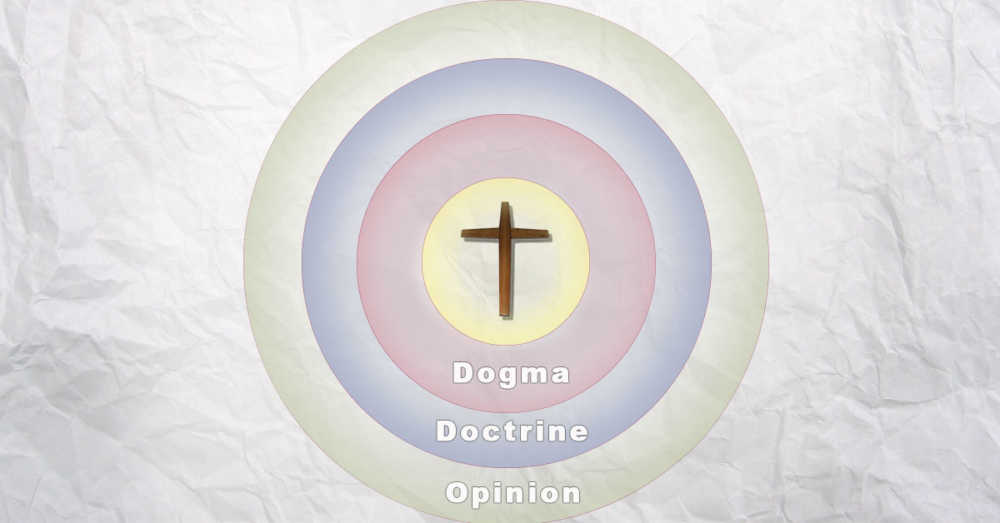We run our website the way we wished the whole internet worked: we provide high quality original content with no ads. We are funded solely by your direct support. Please consider supporting this project.

Thinking Theologically
In a previous post, I challenged the common notion that the Scripture is the foundation or the center of our faith. Instead, it’s my conviction that the only place to begin is Jesus Christ. Paul says that Jesus Christ is the foundation” (1 Cor 3:11). And Peter proclaimed that Jesus is the “cornerstone” that “the builders rejected (1 Pet 2:6-7), which means that the entire edifice of the Christian faith is to be built upon him. The Bible is not that center, but it actually points to the center of our faith, Jesus. This was the confession of the early Church Fathers. “[T]he standing message of the Fathers to the Church Universal,” writes Georges Florovsky, was that “Christ Jesus is the Alpha and Omega of the Scriptures both the climax and the knot of the Bible.”
We must adopt Paul’s humble mindset and start with the confession that we “know nothing … except Jesus Christ and him crucified” (1 Cor 2:2). From beginning to end our thinking about God, our theological beliefs and even our interpretation of Scripture should be centered on the crucified Christ. As Karl Barth brilliantly emphasized throughout his Church Dogmatics, and as Thomas Torrance has more recently clearly elucidated in a number of writings, Jesus is not one of God’s words; Jesus, as the God-become-human, is the Word to which all the words of Scripture bear witness. As such, we should regard him to be the essential content and ultimate purpose of all “God-breathed” words.
With the center of Christ, all other beliefs can be assessed according to their relative importance to that starting point of Christ. Instead of weighing all beliefs on a level plain, I envision three concentric circles surrounding that center. The proximity of each circle to the center reflects its relative importance.

In the first circle out from Christ is what I call Dogma. In this ring are those beliefs that have traditionally been understood to constitute orthodox Christianity, which are reflected in the foundational ecumenical creeds. The belief that God is a Trinity, that Christ is fully God and fully human, and that the world is created and governed by God are examples that we find here.
The second circle is called Doctrine. These are beliefs that orthodox Christians have always espoused, but over which there has been some disagreement. These are different doctrines that distinguish various denominations. For instance, while orthodox Christians have always believed that God governs the world, there are a variety of ways of stating how God does this. You might check out my book co-authored with Paul Eddy called Across the Spectrum to see some of the ways that people hold different Doctrines.
I call the third ring Opinion. Here I place beliefs that individual Christians have occasionally espoused but have not gained widespread support. One might, in other words, claim that my proposal in Crucifixion of the Warrior God falls in this category and is offered to invite further conversation about it. While the ring called Doctrine is comprised of different ways Christians have interpreted Dogma, this third ring usually comprises different ways of interpreting particular Doctrines.
There is plenty of room for different ways of applying this way of thinking theologically. While the church might uniformly agree on that which constitutes Dogma, some will see certain beliefs that should be labeled as Doctrine, while others will argue that they are Opinion. But the most important aspect of this model is that it articulates the fact that not all beliefs are equally important while making it clear that everything revolves around the starting point of our theology: the crucified Christ. This is the center of our theology and all of our theological reflection.
—Adapted from Benefit of the Doubt, pages 170-173
Category: General
Tags: Cruciform Theology, Friendly Disagreements, Heresy
Related Reading

Modern Theologians and the Centrality of Christ
During the twentieth century the development of a Christocentric reading of the Scriptures—which is crucial to understanding what I argue in Crucifixion of the Warrior God—surged in the wake of Karl Barth’s publication of his Romans commentary in 1916. It was justifiably described as a “bombshell” that fell “on the playground of the theologians,” demolishing…

From Boston, With Love
We posted some of T. C. Moore’s reflections on the Open 2013 conference earlier this week. T. C. lives in Boston and was deeply moved by the violence and terror that came to his city. Now we want to share his most recent blog post Oz and the Cross: Reflections on God’s Love and the…

Part 4: An Alternative Cross-Centered Approach
Image by Karl Pang via Flickr As I mentioned in Part II of this review, I am deeply appreciative of the fact that Flood grasps the centrality of enemy-loving non-violence in Jesus’ revelation of God. And while many, if not most, of the depictions of Yahweh in the Old Testament are consistent with this revelation, I…

The Greatest in the Kingdom (2 of 2)
Article by Natalie Frisk This post is a summary of what was discussed at the ReKnew CrossVision Conference in regard to what and how we teach our kids about the cruciform hermeneutic. Taking Jesus into the Old Testament I co-lead a family-friendly home church where we sometimes get into spiritually deep conversations with children. There…

Podcast: Defending the Manifesto (5 of 10)
Greg responds to challenges by William Lane Craig from Craig’s podcast “Reasonable Faith.“ Craig argues that Greg’s model of reading the bible through the lens of Jesus Christ is simply Greg’s way of rejecting the dictation theory of inspiration—which everyone does. Greg denies this and claims that his view of inspiration is more than simply…

The Violent “Church Triumphant”
In light of how central enemy-loving non-violence is to Jesus’ teaching and to his cross-centered revelation of God, we have to wonder why the church has refused to listen to its head and instead condoned violence, as pointed out in the previous post? Christian theologians have used OT’s violent portraits of God, at least since…
